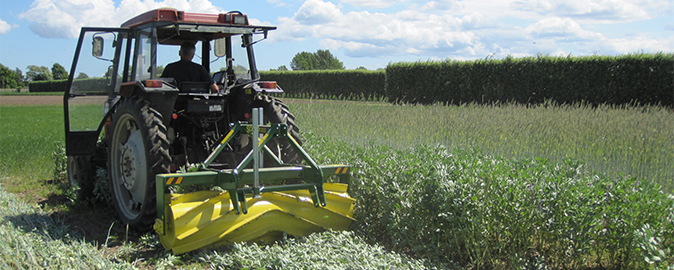Promising no-tillage organic systems for vegetable crops
Researchers from Aarhus University plant white cabbage directly into legume residues without cultivating the soil. This technique allows them to stunt weed growth and improve nitrogen cycling in the system. Within the framework of the research project SoilVeg, researchers examine new methods for organic vegetable production, and the results now start to appear.

No-tillage systems are subject to increased attention, and researchers from the Department of Food Science, Aarhus University, participate in the trans-European project SoilVeg to further investigate aspects of this method. They study how agro-ecological service crops such as winter faba beans and winter peas may be applied when growing main crops such as white cabbage. Specifically, this means that the main crop is planted directly into the dead plant residues of the service crops.
- To vegetable growers, it may seem thought-provoking to plant high-value crops, such as cabbage, directly into plant residues without tillage, but we have noticed that it has a positive impact in more ways than one. One of the primary reasons is that weed occurrence is stunted because the plant residues cover the soil, says Science Leader Hanne Lakkenborg Kristensen, Department of Food Science, Aarhus University. She is in charge of the Danish project activities.
The roller crimper is an important tool
The researchers recently harvested white cabbage from the experimental fields in Aarslev, and the results are promising. Prior to planting white cabbage, they used a roller crimper, which has demonstrated excellent results in the US. The use of the roller crimper is not yet common practice in Europe, but the project examines the impact of the method on European soils.
- Three to four weeks prior to planting the main crop, the service crops are flattened by means of the roller crimper. It breaks the stems instead of cutting or chopping them, which terminates their growth. When planting, we first prepared a furrow with a harrow tooth and then we used the planting machine, explains Hanne Lakkenborg Kristensen.
Service crops ensure nitrogen fixation and biodiversity
Together with her European colleagues, she has accomplished several tasks in the project, and they have noticed certain trends.
- It is very important to pick out the proper species of legumes to act as service crops; in Denmark we have good experiences with winter faba beans and winter peas. It is equally important to use the roller crimper at the right time, thus not allowing the service crops to start re-growing or setting seed, which may cause weed problems later in the season. The right time is around blooming, says Hanne Lakkenborg Kristensen.
Legume service crops have the additional positive impact of fixing nitrogen; the plant cover and the reduced tillage are expected to improve the biodiversity of insects, and have a positive impact on the soil in a long-term perspective. When this method was applied in the Danish trial, a reduced yield was found. But, in return, this technique requires less labour-consuming weeding, and also helps reduce fuel consumption due to less field management.
European perspectives
SoilVeg is a trans-European project comprising nine countries and 35 participants. They carry out experiments in 13 different experimental fields throughout Europe headed by CREA (The Italian Council for Agricultural Research and Policy).
- The European approach provides significant research perspectives, as we – to a higher extent – are able to generalize our understanding of the mechanisms at work, rather than if based solely on Danish results. The fact that we are able to examine the topic at a European level and apply interdisciplinary research expertise, gives us significant new knowledge and strength, says Hanne Lakkenborg Kristensen.
SoilVeg is a trans-European project initiated by the ERA-Net CORE Organic Plus. The Danish participation is funded by the Green Development and Demonstration Fond, the Ministry of Environment and Food of Denmark. ICROFS coordinates CORE Organic Plus.
Further information
Science Leader Hanne Lakkenborg Kristensen
Department of Food Science, Aarhus University
E-mail: hanne.kristensen@food.au.dk
Tel.: +45 87 15 83 54
